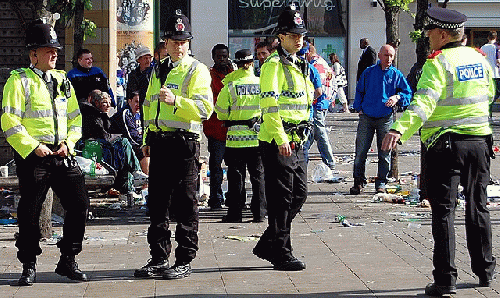The United Kingdom has seen a rise in arrests related to social media posts, igniting a fierce debate about the balance between freedom of expression and maintaining public order.
Critics argue that the government's actions threaten free speech, suggesting that the measures disproportionately target political dissent or aim to placate specific groups, including radical Islamists. Authorities, however, defend their approach as essential to curbing hate speech and preventing societal harm.
Dimitrie Stoica was arrested for making a TikTok video in which he pretended that right-wing rioters were chasing him.
Though he claimed the video was a joke, Assistant Chief Constable Michelle Shooter stated, "As has been made clear by forces across the country, any criminal actions relating to the disorder, whether they be in person or online, will be dealt with quickly and robustly. Whether it is spreading misinformation or being involved in disorder the message is clear -- as a service we are ready to respond and deal with any situation robustly."
Several more arrests for written content have since been made.
UK Prime Minister Keir Starmer said,
"This is not a law free zone. And I think that's clear from the prosecutions and sentencing. Today we're due sentencing for online behavior, that's a reminder to everyone that whether you're directly involved or whether you're remotely involved you're culpable and you'll be put before the courts if you've broken the law."
Director of Public Prosecutions Stephen Parkinson stated, "We do have dedicated police officers who are scouring social media, their job is to look for this material, and then follow up with identification, arrests, and so forth," adding that although people may not think they are doing anything wrong, "they are and the consequences will be visited upon them."
At the same time, few arrests have been made over anti-Semitic content being posted online and Jewish groups have made public their complaints over what appears to be a skewed system.
The controversy stems from the UK's broad legal frameworks, such as the Communications Act 2003 and the Public Order Act 1986, which criminalize messages deemed "grossly offensive" or likely to incite hatred.
This legal latitude has led to a wide interpretation of what constitutes criminal behavior online. While some arrests involve clear cases of hate speech, others have sparked outrage for targeting what many see as legitimate commentary, satire, or personal opinion.
Critics of these arrests argue that they create a chilling effect on public discourse. Some contend that the authorities have selectively enforced these laws to silence viewpoints perceived as politically incorrect or to avoid offending certain communities. This has fueled accusations of appeasement, particularly towards radical elements within Muslim communities, though evidence for such claims remains contentious. The concern, according to these voices, is that fear of backlash has led to an uneven application of justice.
Defenders of the current approach dismiss such accusations, pointing to the importance of addressing online harassment, hate speech, and radicalization. They argue that a robust legal response to harmful content is vital in an age where social media can amplify incendiary rhetoric, leading to real-world consequences. For them, the focus is not on suppressing speech but on preventing harm and protecting marginalized groups from abuse.
The debate is emblematic of broader tensions in liberal democracies over the limits of free speech in the digital era. As platforms like Twitter and Facebook become arenas for public discourse, governments worldwide are grappling with how to regulate content without infringing on individual rights. The UK's approach highlights the challenges of navigating these competing priorities, but it also raises urgent questions about who defines the boundaries of acceptable speech and how those boundaries are enforced.
(Note: You can view every article as one long page if you sign up as an Advocate Member, or higher).






